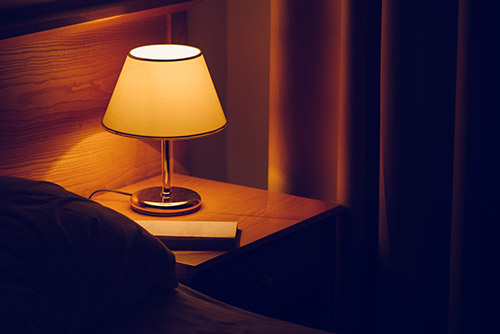
We appreciate the positive feedback from all of us here at Buford’s Manor Lake Assisted Living & Memory Care regarding the practical utility of our blog. It is now August, and the increasing heat index can be deadly for the young and senior alike. But summer danger is not restricted to the outside. While long days of sunlight are generally welcomed, there are reasons for at-home caregivers to be vigilant about summer safety for memory care loved ones inside the home.
The safety of our cherished residents in our top concern, and it should be for all of you at-home care givers as well. We feel a heartfelt responsibility to freely share our professional knowledge regarding professional assisted living and memory care support. So today, we’ll talk about the critical importance of proper lighting inside your home during both day and night.
There are several common problems experienced by those with dementia. We will discuss two:
- Sleep disturbances: Difficulty falling asleep or staying asleep at night as well as difficulty staying awake during the day.
- Sundowning, characterized by increased agitation, restlessness or confusion in the afternoons and early evenings.
Humans have a circadian rhythm, controlling when we sleep and when we are awake. This is mainly regulated by environmental factors such as the level of light that reaches the back of the eye, as well the times of mealtimes and level of activity during the day. Studies have shown a decrease of activity in the part of the brain that controls this rhythm in the elderly. As a result, they are less reactive to this process.
It has been found that persons with dementia spend as much as 40% of the night awake and a large portion of the day asleep. One of the negative results of this change of sleep patterns is the increased risk of falling, as these persons may get up during the night in low light conditions. It also leads to a reduced participation in physical, social and cognitive activities during waking hours.
There are many different theories as to why sundowning occurs. One of the reasons may be that less light reaches the back of the eye due to changes in the brain associated with dementia, causing the person to have a misinterpretation of shadows and objects around the home. This, coupled with the fact that many people with dementia develop tunnel vision, is a recipe for confusion. The changes in the brain can cause the person to interpret the change in light levels in the afternoon and early evening as a very sudden change in light levels. In rare cases, sundowning may also lead to aggression.
Proper light levels in the home help to address both of these conditions. Bright light exposure during the day has been shown to increase daytime wakefulness, improve night-time sleep and reduce evening agitation.
The general guidelines state that bright light (approximately 1000 lux, but no less than 600 lux) during the day stimulates the circadian rhythm. Natural light can contribute to orientate a person to the time of day.
It is especially important to ensure that corridors/hallways have proper lighting to reduce the risk of falls and to prevent shadows or dark spots that may be misinterpreted.
At night, it is recommended that night lights (if used) should not exceed 60 lux, as this can interrupt sleep. White light from screens or bright lights should be avoided at bedtime, as this disrupts the secretion of melatonin, the hormone that aides in sleep.
If you have any questions or concerns regarding how to provide both loving and safe care for your memory care loved one, contact Manor Lake Assisted Living and Memory Care here in Buford.
